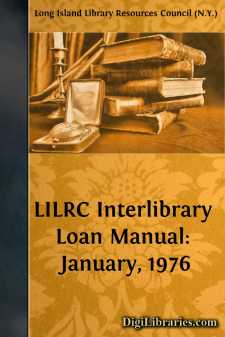Reference
- Atlases 1
- Bibliographies & Indexes 10
- Catalogs 55
- Dictionaries 1
- Encyclopedias 43
- Etiquette 14
- Handbooks & Manuals 19
- Heraldry 2
- Quotations 9
Reference Books
Sort by:
RENEWAL REGISTRATIONS A list of books, pamphlets, serials, and contributions to periodicals for which renewal registrations were made during the period covered by this issue. Arrangement is alphabetical under the name of the author or issuing body or, in the case of serials and certain other works, by title. Information relating to both the original and the renewal registration is included in each...
more...
by:
Various
INITIALS USED IN VOLUME IV. TO IDENTIFY INDIVIDUALCONTRIBUTORS, WITH THE HEADINGS OF THEARTICLES IN THIS VOLUME SO SIGNED.A. B. R.Alfred Barton Rendle, F.R.S., F.L.S., M.A., D.Sc.Keeper of the Department of Botany, British Museum.{Botany.A. E. H.A. E. Houghton.Formerly Correspondent of theStandardin Spain. Author ofRestoration of the Bourbons in Spain.{Cabrera.A. E. S.Arthur Everett Shipley, F.R.S.,...
more...
by:
Various
CHÂTELET (from Med. Lat. castella), the word, sometimes also written castillet, used in France for a building designed for the defence of an outwork or gate, sometimes of great strength or size, but distinguished from the château, or castle proper, in being purely defensive and not residential. In Paris, before the Revolution, this word was applied both to a particular building and to the...
more...
by:
Various
BISHÂRÎN (the anc. Ichthyophagi), a nomad tribe of African “Arabs,” of Hamitic origin, dwelling in the eastern part of the Nubian desert. In the middle ages they were known as Beja (q.v.), and they are the most characteristic of the Nubian “Arabs.” With the Abâbda and Hadendoa they represent the Blemmyes of classical writers. Linguistically and geographically the Bishârîn form a connecting...
more...
CHAPTER I The ancient port of Sunwich was basking in the sunshine of a July afternoon. A rattle of cranes and winches sounded from the shipping in the harbour, but the town itself was half asleep. Somnolent shopkeepers in dim back parlours coyly veiled their faces in red handkerchiefs from the too ardent flies, while small boys left in charge noticed listlessly the slow passing of time as recorded by...
more...
by:
Various
BULGARIA (continued from part 3) ... the mean interval being 60 m.; the summits are, as a rule, rounded, and the slopes gentle. The culminating points are in the centre of the range: Yumrukchál (7835 ft.), Maragudúk (7808 ft.), and KadimlÃa (7464 ft.). The Balkans are known to the people of the country as the Stara Planina or "Old Mountain," the adjective denoting their greater size as...
more...
by:
Anonymous
EXAMINATION QUESTIONSFIRST SERIES 1. Q. What do you consider essential for your success in regard to the use of ? A. I deem it essential to my success to be as economical in the use of fuel and supplies as is consistent with the work to be performed, exercising good judgment in my work, harmonious co-operation with my engineer, and showing a willingness to learn and practice the best methods in my...
more...
by:
Various
ARAM, EUGENE(1704-1759), English scholar, but more famous as the murderer celebrated by Hood in his ballad, theDream of Eugene Aram, and by Bulwer Lytton in his romance ofEugene Aram, was born of humble parents at Ramsgill, Yorkshire, in 1704. He received little education at school, but manifested an intense desire for learning. While still young, he married and settled as a schoolmaster at Netherdale,...
more...
INTERLIBRARY LOAN POLICIES AND PROCEDURES Our interlibrary loan program is based on the premise that lending among libraries for the benefit of individuals in Nassau and Suffolk counties is in the public interest and should be encouraged. It is impossible for any one library to be self-sufficient, and interlibrary borrowing and lending is regarded by the libraries participating in this program as...
more...
by:
Various
CAMORRA, a secret society of Naples associated with robbery, blackmail and murder. The origin of the name is doubtful. Probably both the word and the association were introduced into Naples by Spaniards. There is a Spanish word camorra (a quarrel), and similar societies seem to have existed in Spain long before the appearance of the Camorra in Naples. It was in 1820 that the society first became...
more...











